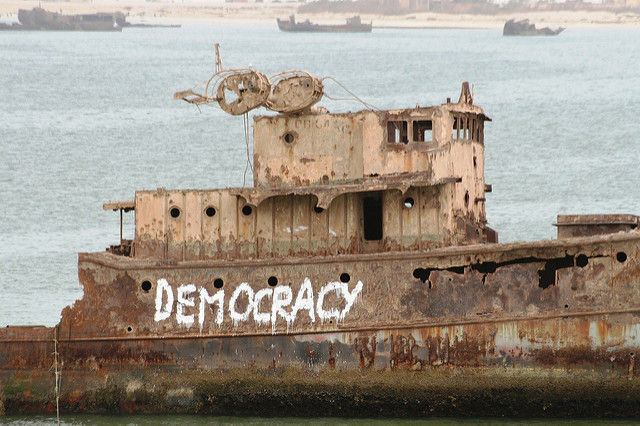As 2016 comes to an end, we’re hearing a lot of talk about the end of liberal politics, and even democracy itself, after the UK voted for Brexit and Donald Trump won the US election. These two events seem to capture the year.The British public voted for the impossible, and the impossible has won the American presidency.
However, it would be a mistake to see 2016 as a break with history. As much as Trump stands for a rupture with conventional politics, the new administration will not be free from the past. President Trump will inherit Obama’s achievements and failings. It seems more likely that the Trump administration will try to reconfigure the existing order. The border could still tighten around Mexican migration like a noose, in other words.
This is similar to what Theresa May is setting out to do in the UK. The May government must make radical change without change itself. If the UK leaves the EU, the British economy needs to adapt to new circumstances and it’s not clear how it will adjust. The main problem being that the UK has no industrial strategy because it has largely given up its industrial base, falling back on a flexible labour market and financial deregulation.
It’s hard to see how Britain can reduce its massive trade deficit given that the economy revolves around finance and the service sector. It’s not that the UK won’t be able to secure trade agreements to get French cheese, Italian wine and German cars. The problem is Britain has little to offer in return after the industrial sector was abandoned. In short, the Conservatives are now trapped by the consequences of their own policies.
Is this the end for liberalism? The New Labour project may have been overtaken by Tory modernisers, only for a new nationalism to take hold with Brexit. The situation is different in the US. There the political system is facing a crisis of its own creation – Trump just filled the void. In both cases, the mainstream has run out of ways to mobilise the base. The centre ground cannot hold, though it may change form.
America First
In the US, Donald Trump represents a demand to reinstate the liberal market economy. Protectionism is a means of insulating the American economy from competitors. American nativism is thus liberal nationalism, exclusionary and blind to oppression. The substratum of Trump’s politics is economic nationalism: ‘America First’ is an erotic call to return to the golden age of capitalism.
In this sense, Trumpism is not far removed from the liberal tradition. It’s too often forgotten that this tradition was Janus-faced from the beginning: one side emancipatory and progressive, the other side exploitative and repressive. This is how classical liberal ideals stood alongside slavery, colonialism and genocide. American society is a perfect example of this.
Though the US was more democratic than many European countries, the political system always had serious in-built limits. The parties are composed of economic blocs and not just the political class and their constituents. The Electoral College was established to constrain the vote and maintain the institution of slavery. Senators were originally appointed to six year terms, and the point of the Senate was to constrain the Congress.
All of this was meant to guarantee long-term stability (which it did until the American Civil War) and prevent demagogues from coming to power (well, until Trump). The popular vote is important in US elections, it’s just not enough on its own. The 2016 election saw the most unpopular candidates come to the forefront of the campaign. The American people got to choose between their least favourite candidates.
in US elections, it’s just not enough on its own. The 2016 election saw the most unpopular candidates come to the forefront of the campaign. The American people got to choose between their least favourite candidates.
Trump embodies the contradictions and failings of the US political system. But it would be a mistake to see this as an aberration. The potential for a figure like Trump has been there for a long time. It may be that Trump will lay the basis for more leaders of his ilk. This was even possible if he lost the election. Much like how Barry Goldwater was the precursor to Ronald Reagan.
A common mistake is to see Trump as a uniquely monstrous figure in American history. It’s as if the White House has never been home to mass-murderers and genocidaires like Andrew Jackson. He promises to cut taxes for the rich and increase military spending. Bush II and Reagan did the same, but they did not share his opposition to immigration and free trade. Where Trump differs, he will be worse.
Britain Last
Brexit shows up the absurdities of the UK establishment. The Conservative government, elected by less than 25% of the eligible electorate, held a referendum to maintain the status quo. Yet it wasn’t to be, the people voted the ‘wrong way’ in June. So now Prime Minister May will lead us out of Europe. A bold, proud future awaits us. At least that’s how May would have us see it.
One Nation Toryism is not possible without the liberal categories of individual rights and market values. All conservative thought is constituted by contradictions. The fetishism of social relations, unthinking instincts, authority and tradition run up against the rapacious forces of capital, the market and the capacities of individualism. Capitalism tends towards cultural relativism and moral individualism, but it also requires more to justify itself.
Enter nationalist populism! The Leave supporters see the referendum as the pure expression of the people’s will, while the Remainers want to keep us in the European Union as a way of ‘saving’ Britain from itself. Of course, the referendum was predetermined by flawed, partially representative institutions. If the UK had had more democracy and equality in the first place, the country may not be in this situation.
Instead, we find ourselves ensnared between two poles: the referendum as ‘perfect democracy’, on the one hand, and partially representative institutions on the other. The potential for constitutional crisis and the breakup of the UK waits ahead. In some ways, this could be an opportunity to right past wrongs. The UK needs a written constitution to overcome a whole series of contradictions.
Of course, the British establishment isn’t pleased with this – they were getting on quite well, with all the contradictions too – and the only hope is to reorientate the system. This is why Brexit could take so long, and will reverberate for decades to come. Talking as if democracy is dead in the water seems premature. The world has not seen enough democracy for it to be a lost cause just yet.
The same might be said for liberalism, however, the world could do with moving beyond its limited horizons. After all, even if we lived in a liberal world freedom would still be distributed by wealth. The real lesson of 2016 may be that it is not enough to hide behind the liberal version of the status quo anymore. Hillary Clinton was not a bulwark against Trump, nor was the EU really a constraint on British capitalism.
Photograph courtesy of Filippo Minelli. Published under a Creative Commons license.





